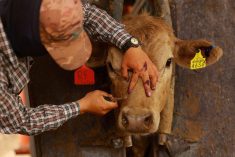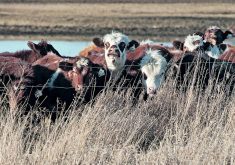Updated –– Canada’s first case of BSE since the country achieved “negligible risk” status for the brain-wasting cattle disease isn’t expected to affect trade in Canadian beef.
The Canadian Food Inspection Agency said Friday it has notified the World Organization for Animal Health (OIE) of a case of “atypical” bovine spongiform encephalopathy (BSE) in an 8-1/2-year-old beef cow on a farm in central Alberta’s Ponoka County.
Atypical BSE, a rare form of the disease, develops naturally and sporadically in affected cattle and is expected to occur at extremely low levels in all cattle populations worldwide, regardless of any BSE control measures in place.
Read Also

Alberta harvest wrapping up: report
Harvest operations advanced to 96 per cent complete in Alberta as of Oct. 7, with only a few late-seeded cereal and canola fields remaining, according to the latest provincial crop report.
The case announced Friday is the third atypical case to be found in Canada, following one each in 2006 and 2007.
Atypical BSE has never been reported to transmit to people, unlike “classical” BSE, which caused the other 17 cases confirmed in domestic Canadian cattle between 2003 and 2015 — and which occurs in cattle when an animal eats feed contaminated with the misfolded protein that causes the disease.
According to CFIA, about 92 per cent of atypical BSE cases found worldwide have been detected in animals over eight years old; the youngest reported was age five years, seven months.
Alberta’s Agriculture Minister Nate Horner, in a separate statement Friday, said atypical BSE “spontaneously happens at a rate of about one in one million cattle regardless of how well a producer takes care of their herd.”
Atypical BSE, he noted, “has been reported six times in the U.S., most recently in 2018, as well as a few other countries.”
The new case “will not affect the OIE negligible risk status of Canada and market access for Canadian animals and beef products should be unaffected,” CFIA said in a statement Friday.
That said, the federal government “will work with the cattle and beef industries to maintain the confidence of international trading partners to maintain market access for Canadian animals and products.”
Since the new case has been confirmed atypical, no further actions on the animal’s home farm are required, CFIA said, meaning no quarantines or other restrictions are to be put in place there.
Horner said the “quick discovery of this atypical case proves how effective the Canada and Alberta BSE surveillance program is and how dedicated our producers are to eliminating BSE in Canada’s cattle herd.”
According to CFIA’s report to the OIE, the cow in question was seen by a veterinarian on Dec. 6 after appearing injured and showing some “neurological signs.” BSE was confirmed Thursday by CFIA’s Lethbridge reference lab; the carcass was held and did not enter the food or feed supply chains.
Provincial and CFIA officials will meet Monday with stakeholders from across Alberta’s cattle industry, he said, “to answer questions and reassure them that all levels of government are working together on this case.”
To maintain negligible-risk status at the OIE, a country must show its last case of “classical” BSE was born more than 11 years ago and effective control measures and surveillance systems are in place. Canada’s last such BSE case was in a cow born in 2009.
BSE is in the family of transmissible spongiform encephalopathies (TSEs) such as scrapie in sheep, chronic wasting disease in deer and elk, and Creutzfeldt-Jakob disease in people.
No treatment or vaccine against BSE is yet available, and no method yet exists to confirm the BSE agent’s presence in live animals.
From a public health perspective, the deaths of about 230 people worldwide from a variant form of Creutzfeldt-Jakob disease (vCJD) are believed to be connected to consumption of contaminated beef from BSE-infected cattle.
According to Health Canada, no cases of vCJD have ever been linked to eating Canadian beef and BSE in Canada poses an “extremely low” risk to human health. — Glacier FarmMedia Network
Updated, Dec. 20, 2021: Further details from CFIA’s report to the OIE are now included.
















